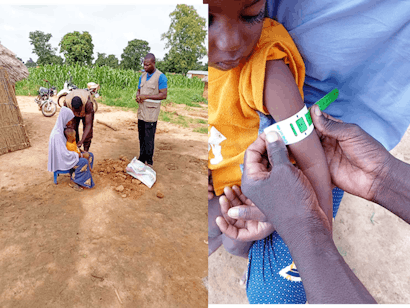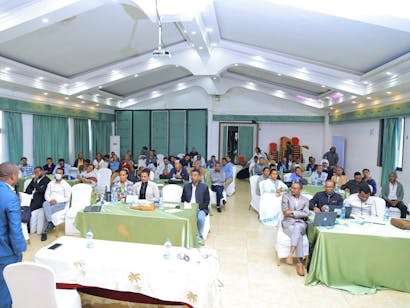Planting Change at Home; How Hut Gardens Are Strengthening Food Security in Benin
Across the departments of Couffo, Ouémé, and Zou in Benin, a quiet transformation is taking root quite literally. Small gardens next to family homes, often referred to as hut gardens, are making a comeback. Once a traditional practice, these home gardens are now being revived and scaled through the CASCADE project, led by the CARE Benin/Togo consortium and GAIN, with funding from the Ministry of Foreign Affairs of the Kingdom of the Netherlands. What might seem like a modest activity, growing vegetables just steps from one’s front door, is proving to be a powerful tool for improving diets, boosting resilience, and reducing household food expenses.
Building on What Works;
From Farmer Field Schools to Home Gardens
In 2024, the CASCADE project applied CARE’s Farmer Field and Business School (FFBS) approach in targeted communities to promote sustainable agriculture and income-generating activities. With support from the Territorial Agricultural Development Agencies (ATDA), demonstration units were set up to help local producer groups adopt new techniques and boost yields.
The results were encouraging. Communities saw improved harvests and began integrating nutritious crops into their diets and markets. But one of the most meaningful outcomes was how families took the lessons home literally.
Albertine ADOGBA, a member of the “Agri la lumière” group in Sota-Aigbadji, shared her experience:
“Last year, we grew nightshade on a demonstration plot using the FFBS method and got excellent yields. We all consumed vegetables at home. Later, CASCADE gave us vegetable seeds, and each of us started growing our gardens at home. That’s what we’ve continued doing“
Production of nightshade in a house garden
This shift from group-based learning to household practice shows how agricultural education can empower families to take ownership of their nutrition.
Fresh Food at the Doorstep: A Simple but Powerful Shift
In communes like Djidja and Toviklin, people are rethinking how and what they eat. Families are using open spaces near their homes to grow fresh vegetables. Others are raising small livestock like chickens, adding animal protein to their diets in cost-effective ways.
Albertine AFAGNON, who now maintains a garden outside her home, explains:
“I wasn’t used to growing vegetables myself. But thanks to CASCADE, I’ve started doing it. Now, I can just walk around the wall of my house, pick some fresh greens, and cook them right away.”
Maintenance of a hut garden/ Chicken coop in Djidja
These small gardens are doing more than just filling plates, they’re changing routines and reshaping how families think about food. As this practice spreads, it begins to influence food availability and dietary patterns across entire communities.
Sowing the Seeds of System Change
The positive momentum is set to grow. A new initiative under CASCADE, titled “Nutrition at the heart of agricultural activities in Djidja and Toviklin,” aims to support 10,000 women farmers in producing, processing, and consuming nutrient-rich foods.
Project manager Edmond ZINZINDOHOUE explains:
“The goal is for every household to improve their fruit and vegetable intake through their home production. A hut garden helps families grow clean, healthy food while saving money“
When households start feeding themselves nutritious, homegrown food, they build resilience against shocks, from price fluctuations to climate stress. Over time, these individual actions lead to broader system change: shifting consumption habits, influencing local food markets, and building a culture of self-reliance.
A Quiet Revolution in Every Yard
The idea of “one hut, one garden” is taking root across the communes. Each garden may be small, but together they represent a quiet revolution in how families nourish themselves, manage their resources, and contribute to a stronger food system.
With every seed planted, communities are not just growing vegetables, they’re growing hope, stability, and a healthier future.
Authored by: Augustine Laourou;
Knowledge Management and Communication Officer _ CARE Benin Togo





